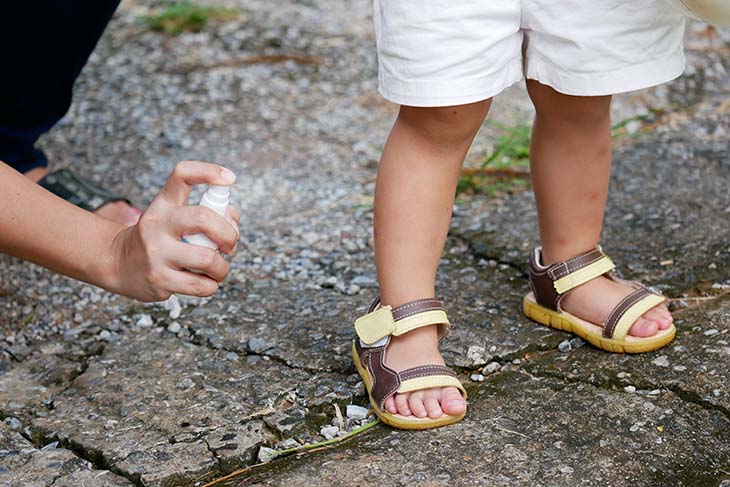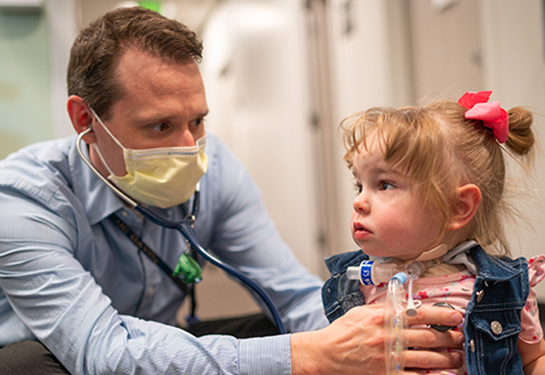What you need to know about West Nile virus and other mosquito-borne illnesses
How to treat mosquito bites and safeguard against disease
Mosquito bites are not only uncomfortable, but they also pose a risk of transmitting severe illnesses. That’s why mosquitos are considered one of the deadliest animals in the world, responsible for more than 1 million deaths per year worldwide.
As we head into the warmer months, we asked UC Davis pediatrician Rachel Caynak how to best protect against and treat mosquito bites and how to safeguard against mosquito-borne illness.
What are some of the most common mosquito-bourne diseases?
In the U.S., West Nile virus is probably the most common disease spread by mosquitos. This may cause fever, headache, and in severe cases, neurologic disease like meningitis. Luckily for children, it is more likely to be symptomatic and severe in adults.

Some mosquito species in parts of the U.S. and its territories can transmit dengue, chikungunya and Zika virus. These areas include Florida, Texas, Puerto Rico, the US Virgin Islands and American Samoa. A few cases of Eastern equine encephalitis (EEE) virus are also reported each year in eastern and Gulf Coast states.
Dengue is also known as breakbone fever, with a sudden onset of fever and rash, and severe joint and muscle pains. Chikungunya may also cause fever and joint pains, and the pain may be debilitating and last for months. Zika may severely affect the developing fetus. Although EEE is rare, approximately 30% of people with EEE die and many survivors have ongoing neurologic problems.
In other parts of the world, mosquitos spread malaria and yellow fever. Fortunately in the U.S., malaria transmission is almost completely eliminated. But worldwide, malaria causes more than 200 million infections a year, and more than 400,000 deaths a year, mostly in children in Africa.
So what can we do to reduce the risk of getting a mosquito bite, and potentially being exposed to one of these diseases?
At home, make sure you are checking your yard to ensure there is no standing water. Think pots in the garden. Clean your gutters. Mosquitos like warmer weather, so they tend to be the worst in summer, but the exact “mosquito season” is different depending on where you live.
When you’re going outside around dusk or dawn, which is the most appealing times for mosquitos, make sure you dress yourself and your child in long sleeves and long pants.
A study, looking at blood type, found that people with blood type O were more likely to be bitten by mosquitoes, but I think the jury is still out on the real reason some people are more delicious than others. —Rachel Caynak
Which mosquito repellents do you recommend?
There are chemical repellants (most common are DEET and Picaridin) that protect against mosquitos, ticks and other flies. DEET-containing repellents are effective and safe, but in children, we do not want to use a concentration of more than 30% DEET.
Chemical repellents should not be used on infants younger than 2 months. The concentration of DEET in a product indicates how long the product will be effective — a higher concentration works for a longer time. For example, 10% DEET provides protection for about 2 hours, and 30% DEET protects for about 5 hours, so it’s appropriate to use the minimum concentration for the amount of time you expect to be outside. The CDC recommends using products with a minimum of 20% DEET.
Picaridin is considered equally effective, and some prefer it because it has minimal odor and no damaging effect on plastics and other materials in the way DEET does. Take care when applying all of these chemical products to kids and make sure to only use them on skin-exposed areas. Avoid the hands, mouth and eyes.
How about natural repellents like plant oils (citronella, lemon, etc.)?
These are safe, but have not been approved for effectiveness by the Environmental Protection Agency. Most of these keep insects away for only a short time. In addition, some natural repellents can cause skin irritation if your child has sensitive skin and many of these oils can be toxic if ingested, so it’s important to keep them away from small children. If there is a serious risk for mosquito-borne illnesses in your area, we would recommend a product with DEET or picaridin. If not, natural repellents should be fine for short-term use.
What about clothing that says it has insect repellant in it? Are these recommended for children who may be going to high-risk areas?
Yes. Most of this clothing is treated with permethrin, an insect repellant that deters both mosquitos and ticks, although many parents may know it from having to use it on their kids’ head for lice. Remember it will only protect the area covered by the clothing. It appears that a very small amount is absorbed through the skin, so it poses a very low risk to children. This clothing should be washed separately from your other laundry and is usually only effective for a predetermined number of washes.
How about treatment of mosquito bites?
Some people can have a large local reaction that can be commonly mistaken for a skin infection or an allergy. But most people have a far less robust response to mosquito bites. Most are just annoying and itchy. While some people may be sensitive to the bite and have a larger local skin reaction, people do not have anaphylaxis to a mosquito bite. After getting a mosquito bite, you can have your child ice the area, apply an over-the-counter steroid or anti itch cream (like hydrocortisone or calamine lotion.)
Because these bites can be itchy, it’s important to keep fingernails clean and if needed, cover the bite with a bandage. If you notice a scab has developed on top of the bite or there is new honey crusting or drainage from the area, you can at times develop a small superficial skin infection which is impetigo.
If you notice this, it’s appropriate to try cleaning the area with a gentle soap and apply an over-the-counter anti-bacterial ointment such as polysporin or Neosporin twice to three times daily. If it doesn’t improve, check with your pediatrician.
Why do some people attract mosquitoes more than others?
There have been some studies that female mosquitos (the only ones to actually bite humans) have odor receptors that can sense increased CO2 emission but it may also just be your unique odor. A study, looking at blood type, found that people with blood type O were more likely to be bitten by mosquitoes, but I think the jury is still out on the real reason some people are more delicious than others.
Related links



